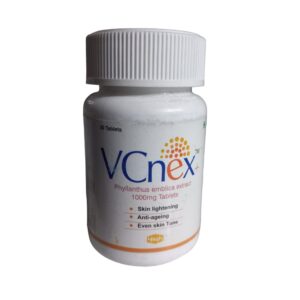ASCORBIC ACID + SODIUM ASCORBATE
Ascorbic Acid: Ascorbic Acid, also known as Vitamin C, is a water-soluble vitamin that is essential for various bodily functions. It is used as a dietary supplement to prevent or treat Vitamin C deficiency.
The main function of Ascorbic Acid is to act as an antioxidant, protecting cells from damage caused by free radicals. It also plays a crucial role in collagen synthesis, iron absorption, immune function, and wound healing.
As a supplement, the recommended daily dose varies depending on age, sex, and specific health conditions. For adults, the recommended daily intake is typically 75-90 mg for women and 90-120 mg for men. Higher doses are sometimes prescribed for individuals with certain medical conditions or during times of increased stress or illness.
Side effects of Ascorbic Acid are generally rare, especially when taken in appropriate doses. However, high doses of Vitamin C can sometimes cause gastrointestinal disturbances such as diarrhea, nausea, and stomach cramps. In individuals with a history of kidney stones, excess Vitamin C intake can increase the risk of calcium oxalate kidney stone formation. Allergic reactions to Ascorbic Acid are extremely rare but can occur.
It is important to note that Ascorbic Acid supplements should not be used as a substitute for a healthy diet rich in fruits and vegetables. While it may be necessary in cases of deficiency or certain medical conditions, a balanced diet is the best way to obtain an adequate intake of Vitamin C. It is always advisable to consult with a healthcare professional before starting any new supplement regimen.
Sodium Ascorbate: Drug: Sodium Ascorbate
Use: Sodium Ascorbate is a form of Vitamin C supplement that is used to treat and prevent Vitamin C deficiency. It is also used as an antioxidant to boost the immune system, promote wound healing, and support overall health.
Mechanism of Action: Sodium Ascorbate works by increasing the levels of Vitamin C in the body. Vitamin C is an essential nutrient that plays a crucial role in various biological processes. It acts as an antioxidant, protecting cells from damage caused by free radicals. It also supports the production of collagen, a protein that helps in the formation of skin, blood vessels, cartilage, and other tissues.
Dose: The recommended dose of Sodium Ascorbate depends on the specific deficiency or condition being treated. The typical oral dose for adults is in the range of 500-2000 mg per day, divided into multiple doses. However, it is important to consult a healthcare professional for personalized dosing instructions.
Side Effects: Sodium Ascorbate is generally well-tolerated when used in recommended doses. However, excessive intake of Vitamin C can cause certain side effects, including diarrhea, nausea, stomach cramps, and headaches. High doses may also increase the risk of kidney stones in individuals with a history of renal disorders. Rarely, allergic reactions such as rash or itching may occur. If any unexpected or severe side effects are experienced, it is advisable to seek medical attention promptly.

